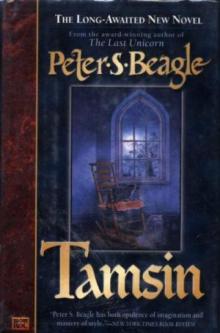- Home
- Peter S. Beagle
Mirror Kingdoms: The Best of Peter S. Beagle Page 4
Mirror Kingdoms: The Best of Peter S. Beagle Read online
Page 4
“On my back,” it said, and no more. The Professor had barely scrambled up its warty, unyielding flanks and heaved himself precariously over the spine his legs could not straddle when there came a surge like the sea under him as the great beast leaped forward. He cried out in terror.
He would have expected, had he had wit enough at the moment to expect anything, that the rhinoceros would move at a ponderous trot, farting and rumbling, gradually building up a certain clumsy momentum. Instead, he felt himself flying, truly flying, as children know flying, flowing with the night sky, melting into the jeweled wind. If the rhinoceros’s huge, flat, three-toed feet touched the ground, he never felt it: nothing existed, or ever had existed, but the sky that he was and the bodiless power that he had become—he himself, the once and foolish old Professor Gustave Gottesman, his eyes full of the light of lost stars. He even forgot Sally Lowry, only for a moment, only for the least little time.
Then he was standing in the courtyard before her house, shouting and banging maniacally on the door, pressing every button under his hand. The rhinoceros was nowhere to be seen. The building door finally buzzed open, and the Professor leaped up the stairs like a young man, calling Sally’s name. Her own door was unlocked; she often left it so absentmindedly, no matter how much he scolded her about it. She was in her bedroom, half-wedged between the side of the bed and the night table, with the telephone receiver dangling by her head. Professor Gottesman touched her cheek and felt the fading warmth.
“Ah, Sally,” he said. “Sally, my dear.” She was very heavy, but somehow it was easy for him to lift her back onto the bed and make a place for her among the books and papers that littered the quilt, as always. He found her harmonica on the floor, and closed her fingers around it. When there was nothing more for him to do, he sat beside her, still holding her hand, until the room began to grow light. At last he said aloud, “No, the sentimental Switzer will not cry, my dear Sally,” and picked up the telephone.
The rhinoceros did not return for many days after Sally Lowry’s death. Professor Gottesman missed it greatly when he thought about it at all, but it was a strange, confused time. He stayed at home, hardly eating, sleeping on his feet, opening books and closing them. He never answered the telephone, and he never changed his clothes. Sometimes he wandered endlessly upstairs and down through every room in his house; sometimes he stood in one place for an hour or more at a time, staring at nothing. Occasionally the doorbell rang, and worried voices outside called his name. It was late autumn, and then winter, and the house grew cold at night, because he had forgotten to turn on the furnace. Professor Gottesman was perfectly aware of this, and other things, somewhere.
One evening, or perhaps it was early one morning, he heard the sound of water running in the bathtub upstairs. He remembered the sound, and presently he moved to his living room chair to listen to it better. For the first time in some while, he fell asleep, and woke only when he felt the rhinoceros standing over him. In the darkness he saw it only as a huge, still shadow, but it smelled unmistakably like a rhinoceros that has just had a bath. The Professor said quietly, “I wondered where you had gone.”
“We unicorns mourn alone,” the rhinoceros replied. “I thought it might be the same for you.”
“Ah,” Professor Gottesman said. “Yes, most considerate. Thank you.”
He said nothing further, but sat staring into the shadow until it appeared to fold gently around him. The rhinoceros said, “We were speaking of Spinoza.”
Professor Gottesman did not answer. The rhinoceros went on, “I was very interested in the comparison you drew between Spinoza and Thomas Hobbes. I would enjoy continuing our discussion.”
“I do not think I can,” the Professor said at last. “I do not think I want to talk anymore.”
It seemed to him that the rhinoceros’s eyes had become larger and brighter in its own shadow, and its horn a trifle less hulking. But its stomach rumbled as majestically as ever as it said, “In that case, perhaps we should be on our way.”
“Where are we going?” Professor Gottesman asked. He was feeling oddly peaceful and disinclined to leave his chair. The rhinoceros moved closer, and for the first time that the Professor could remember its huge, hairy muzzle touched his shoulder, light as a butterfly.
“I have lived in your house for a long time,” it said. “We have talked together, days and nights on end, about ways of being in this world, ways of considering it, ways of imagining it as a part of some greater imagining. Now has come the time for silence. Now I think you should come and live with me.”
They were outside, on the sidewalk, in the night. Professor Gottesman had forgotten to take his coat, but he was not at all cold. He turned to look back at his house, watching it recede, its lights still burning, like a ship leaving him at his destination. He said to the rhinoceros, “What is your house like?”
“Comfortable,” the rhinoceros answered. “In honesty, I would not call the hot water as superbly lavish as yours, but there is rather more room to maneuver. Especially on the stairs.”
“You are walking a bit too rapidly for me,” said the Professor. “May I climb on your back once more?” The rhinoceros halted immediately, saying, “By all means, please do excuse me.” Professor Gottesman found it notably easier to mount this time, the massive sides having plainly grown somewhat trimmer and smoother during the rhinoceros’s absence, and easier to grip with his legs. It started on briskly when he was properly settled, though not at the rapturous pace that had once married the Professor to the night wind. For some while he could hear the clopping of cloven hooves far below him, but then they seemed to fade away. He leaned forward and said into the rhinoceros’s pointed silken ear, “I should tell you that I have long since come to the conclusion that you are not after all an Indian rhinoceros, but a hitherto unknown species, somehow misclassified. I hope this will not make a difference in our relationship.”
“No difference, good Professor,” came the gently laughing answer all around him. “No difference in the world.”
THE LAST AND ONLY,
OR,
MR. MOSCOWITZ BECOMES FRENCH
Once upon a time, there lived in California a Frenchman named George Moscowitz. His name is of no importance—there are old families in France named Wilson and Holmes, and the first president of the Third Republic was named MacMahon—but what was interesting about Mr. Moscowitz was that he had not always been French. Nor was he entirely French at the time we meet him, but he was becoming perceptibly more so every day. His wife, whose name was Miriam, drew his silhouette on a child’s blackboard and filled him in from the feet up with tricolor chalk, adding a little more color daily. She was at mid-thigh when we begin our story.
Most of the doctors who examined Mr. Moscowitz agreed that his affliction was due to some sort of bug that he must have picked up in France when he and Mrs. Moscowitz were honeymooning there, fifteen years before. In its dormant stage, the bug had manifested itself only as a kind of pleasant Francophilia: on their return from France Mr. Moscowitz had begun to buy Linguaphone CDs, and to get up at six in the morning to watch a cable television show on beginner’s French. He took to collecting French books and magazines, French music and painting and sculpture, French recipes, French folklore, French attitudes, and, inevitably, French people. As a librarian in a large university, he came in contact with a good many French exchange students and visiting professors, and he went far out of his way to make friends with them—Mr. Moscowitz, shy as a badger. The students had a saying among themselves that if you wanted to be French in that town, you had to clear it with Monsieur Moscowitz, who issued licenses and cartes de séjour. The joke was not especially unkind, because Mr. Moscowitz often had them to dinner at his home, and in his quiet delight in the very sound of their voices they found themselves curiously less bored with themselves, and with one another. Their companions at dinner were quite likely to be the ignorant Marseillais tailor who got all of Mr. Moscowitz’s custom, or the Canuck
coach of the soccer team, but there was something so touching in Mr. Moscowitz’s assumption that all French-speaking people must be naturally at home together that professors and proletariat generally managed to find each other charming and valuable. And Mr. Moscowitz himself, speaking rarely, but sometimes smiling uncontrollably, like an exhalation of joy—he was a snob in that he preferred the culture and manners of another country to his own, and certainly a fool in that he could find wisdom in every foolishness uttered in French—he was marvelously happy then, and it was impossible for those around him to escape his happiness. Now and then he would address a compliment or a witticism to his wife, who would smile and answer softly, “Merci,” or “La-la,” for she knew that at such moments he believed without thinking about it that she too spoke French.
Mrs. Moscowitz herself was, as must be obvious, a patient woman of a tolerant humor, who greatly enjoyed her husband’s enjoyment of all things French, and who believed, firmly and serenely, that this curious obsession would fade with time, to be replaced by bridge or chess, or—though she prayed not—golf. “At least he’s dressing much better these days,” she told her sister Dina, who lived in Scottsdale, Arizona. “Thank God you don’t have to wear plaid pants to be French.”
Then, after fifteen years, whatever it was that he had contracted in France, if that was what he had done, came fully out of hiding; and here stood Mr. Moscowitz in one doctor’s office after another, French from his soles to his ankles, to his shins, to his knees, and still heading north for a second spring. (Mrs. Moscowitz’s little drawing is, of course, only a convenient metaphor—if anything her husband was becoming French from his bones out.) He was treated with drugs as common as candy and as rare as turtle tears by doctors ranging from Johns Hopkins specialists to a New Guinea shaman; he was examined by herbalists and honey-doctors, and by committees of medical men so reputable as to make illness in their presence seem almost criminal; and he was dragged to a crossroads one howling midnight to meet with a half-naked, foamy-chinned old man who claimed to be the son of Merlin’s affair with Nimue, and a colonel in the Marine Reserves besides. This fellow’s diagnosis was supernatural possession; his prescribed remedy would cost Mr. Moscowitz a black pig (and the pig its liver), and was impractical, but the idea left Mr. Moscowitz thoughtful for a long time.
In bed that night, he said to his wife, “Perhaps it is possession. It’s frightening, yes, but it’s exciting too, if you want the truth. I feel something growing inside me, taking shape as it crowds me out, and the closer I get to disappearing, the clearer it becomes. And yet, it is me too, if you understand—I wish I could explain to you how it feels—it is like, ’ow you say….”
“Don’t say that,” Mrs. Moscowitz interrupted with tears in her voice. She had begun to whimper quietly when he spoke of disappearing. “Only TV Frenchmen talk like that.”
“Excuse-moi, ma vieille. The more it crowds me, the more it makes me feel like me. I feel a whole country growing inside me, thousands of years, millions of people, stupid, crazy, shrewd people, and all of them me. I never felt like that before, I never felt that there was anything inside me, even myself. Now I’m pregnant with a whole country, and I’m growing fat with it, and one day—” He began to cry himself then, and the two of them huddled small in their bed, holding hands all night long. He dreamed in French that night, as he had been doing for weeks, but he woke up still speaking it, and he did not regain his English until he had had his first cup of coffee. It took him longer each morning thereafter.
A psychiatrist whom they visited when Mr. Moscowitz’s silhouette was French to the waist commented that his theory of possession by himself was a way of sidling up to the truth that Mr. Moscowitz was actually willing his transformation. “The unconscious is ingenious at devising methods of withdrawal,” he explained, pulling at his fingertips as though milking a cow, “and national character is certainly no barrier to a mind so determined to get out from under the weight of being an American. It’s not as uncommon as you might think, these days.”
“Qu’est-ce qu’il dit?” whispered Mr. Moscowitz to his wife.
“I have a patient,” mused the psychiatrist, “who believes that he is gradually being metamorphosed into a roc, such a giant bird as carried off Sindbad the Sailor to lands unimaginable and riches beyond comprehension. He has asked me to come with him to the very same lands when his change is complete.”
“Qu’est-ce qu’il dit? Qu’est-ce que c’est, roc?” Mrs. Moscowitz shushed her husband nervously and said, “Yes, yes, but what about George? Do you think you can cure him?”
“I won’t be around,” said the psychiatrist. There came a stoop of great wings outside the window, and the Moscowitzes fled.
“Well, there it is,” Mrs. Moscowitz said when they were home, “and I must confess I thought as much. You could stop this stupid change yourself if you really wanted to, but you don’t want to stop it. You’re withdrawing, just the way he said, you’re escaping from the responsibility of being plain old George Moscowitz in the plain old United States. You’re quitting, and I’m ashamed of you—you’re copping out.” She hadn’t used the phrase since her own college days, at Vassar, and it made her feel old and even less in control of this disturbing situation.
“Cop-out, cop-out,” said Mr. Moscowitz thoughtfully. “What charm! I love it very much, the American slang. Cop-out, copping out. I cop out, tu cop out, they all cop out….”
Then Mrs. Moscowitz burst into tears, and picking up her colored chalks, she scribbled up and down and across the neat silhouette of her husband until the chalk screamed and broke, and the whole blackboard was plastered red, white, and blue; and as she did this, she cried “I don’t care, I don’t care if you’re escaping or not, or what you change into. I wouldn’t care if you turned into a cockroach, if I could be a cockroach too.” Her eyes were so blurred with tears that Mr. Moscowitz seemed to be sliding away from her like a cloud. He took her in his arms then, but all the comfort he offered her was in French, and she cried even harder.
It was the only time she ever allowed herself to break down. The next day she set about learning French. It was difficult for her, for she had no natural ear for language, but she enrolled in three schools at once—one for group study, one for private lessons, and the other online—and she worked very hard. She even dug out her husband’s abandoned language CDs and listened to them constantly. And during her days and evenings, if she found herself near a mirror, she would peer at the plump, tired face she saw there and say carefully to it, “Je suis la professeur. Vous êtes l’étudiante. Je suis française. Vous n’êtes pas française.” These were the first four sentences that the recordings spoke to her every day. It had occurred to her—though she never voiced the idea—that she might be able to will the same change that had befallen her husband on herself. She told herself often, especially after triumphing over her reflection, that she felt more French daily; and when she finally gave up the pretense of being transformed, she said to herself, “It’s my fault. I want to change for him, not for myself. It’s not enough.” She kept up with her French lessons, all the same.
Mr. Moscowitz, on his part, was finding it necessary to take English lessons. His work in the library was growing more harassing every day: he could no longer read the requests filed by the students—let alone the forms and instructions on his own computer screen—and he had to resort to desperate guessing games and mnemonic systems to find anything in the stacks or on the shelves. His condition was obvious to his friends on the library staff, and they covered up for him as best they could, doing most of his work while a graduate student from the French department sat with him in a carrel, teaching him English as elementary as though he had never spoken it. But he did not learn it quickly, and he never learned it well, and his friends could not keep him hidden all the time. Inevitably, the Chancellor of the university interested himself in the matter, and after a series of interviews with Mr. Moscowitz—conducted in French, for the Chancellor was a tr
aveled man who had studied at the Sorbonne—announced regretfully that he saw no way but to let Mr. Moscowitz go. “You understand my position, Georges, my old one,” he said, shrugging slightly and twitching his mouth. “It is a damage, of course, well understood, but there will be much severance pay and a pension of the fullest.” The presence of a Frenchman always made the Chancellor a little giddy.
“You speak French like a Spanish cow,” observed Mr. Moscowitz, who had been expecting this decision and was quite calm. He then pointed out to the Chancellor that he had standing to spare, and that he was not about to be gotten rid of so easily. Even in this imbecile country, an employee had his rights, and it was on the Chancellor’s shoulders to find a reason for discharging him. He requested the Chancellor to show him a single university code, past or present, that listed change of nationality as sufficient grounds for terminating a contract; and he added that he was older than the Chancellor and had given him no encouragement to call him tu.
“But you’re not the same man we hired!” cried the Chancellor in English.
“No?” asked Mr. Moscowitz when the remark had been explained to him. “Then who am I, please?”
The university would have been glad to settle the case out of court, and Mrs. Moscowitz pleaded with her husband to accept their offered terms, which were liberal enough; but he refused, for no reason that she could see but delight at the confusion and embarrassment he was about to cause, and a positive hunger for the tumult of a court battle. The man she had married, she remembered, had always found it hard to show anger even to his worst enemy, for fear of hurting his feelings; but she stopped thinking about it at that point, not wanting to make the Chancellor’s case for him. “You are quite right, George,” she told him, and then, carefully, “Tu as raison, mon chou.” He told her—as nearly as she could understand—that if she ever learned to speak French properly she would sound like a Basque, so she might as well not try. He was very rude to the Marseillais tailor these days.

 The Unicorn Anthology.indb
The Unicorn Anthology.indb Sleight of Hand
Sleight of Hand Return
Return The Last Unicorn
The Last Unicorn Two Hearts
Two Hearts Mirror Kingdoms: The Best of Peter S. Beagle
Mirror Kingdoms: The Best of Peter S. Beagle My Son Heydari and the Karkadann
My Son Heydari and the Karkadann The Magician of Karakosk, and Other Stories
The Magician of Karakosk, and Other Stories The Urban Fantasy Anthology
The Urban Fantasy Anthology The Story of Kao Yu
The Story of Kao Yu The Karkadann Triangle
The Karkadann Triangle My Son and the Karkadann
My Son and the Karkadann The New Voices of Fantasy
The New Voices of Fantasy A Dance for Emilia
A Dance for Emilia We Never Talk About My Brother
We Never Talk About My Brother The Folk Of The Air
The Folk Of The Air The Magician of Karakosk: Tales from the Innkeeper's World
The Magician of Karakosk: Tales from the Innkeeper's World A Fine and Private Place
A Fine and Private Place Lila The Werewolf
Lila The Werewolf Tamsin
Tamsin Innkeeper's Song
Innkeeper's Song